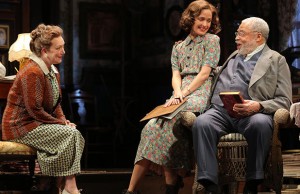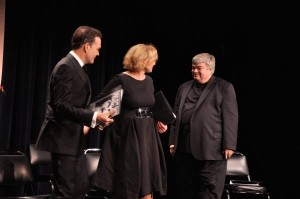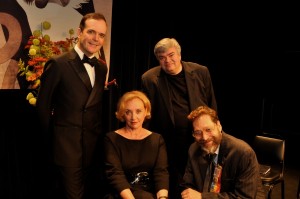 “The ironist is not bitter, he does not seek to undercut everything that seems worthy or serious, he scorns the cheap scoring-off of the wisecracker. He stands, so to speak, somewhat at one side, observes and speaks with a moderation which is occasionally embellished with a flash of controlled exaggeration. He speaks from a certain depth, and thus he is not of the same nature as the wit, who so often speaks from the tongue and no deeper. The wit’s desire is to be funny; the ironist is only funny as a secondary achievement.”
“The ironist is not bitter, he does not seek to undercut everything that seems worthy or serious, he scorns the cheap scoring-off of the wisecracker. He stands, so to speak, somewhat at one side, observes and speaks with a moderation which is occasionally embellished with a flash of controlled exaggeration. He speaks from a certain depth, and thus he is not of the same nature as the wit, who so often speaks from the tongue and no deeper. The wit’s desire is to be funny; the ironist is only funny as a secondary achievement.”
Robertson Davies, The Cunnng Man

 Kaufman and Hart invented or perfected many of the now-formulaic devices that power TV sitcoms, and one of them, the crazy family with a single sane member, is displayed to well-tooled effect in the saga of the Vanderhofs, whose contentedly haphazard daily lives are concisely summed up in the first paragraph of the stage directions: “This is a house where you do as you like, and no questions asked.” No less seductive, though, is the fantasy that they collectively embody: Not only do they follow their bliss to the uttermost limits of absurdity, but the rent gets paid and the pantry filled without their having to hold down nine-to-five jobs…
Kaufman and Hart invented or perfected many of the now-formulaic devices that power TV sitcoms, and one of them, the crazy family with a single sane member, is displayed to well-tooled effect in the saga of the Vanderhofs, whose contentedly haphazard daily lives are concisely summed up in the first paragraph of the stage directions: “This is a house where you do as you like, and no questions asked.” No less seductive, though, is the fantasy that they collectively embody: Not only do they follow their bliss to the uttermost limits of absurdity, but the rent gets paid and the pantry filled without their having to hold down nine-to-five jobs…
 As for me, I wasn’t nervous, just excited, perhaps because I didn’t have all that much to do. Whatever the reason, I read my lines as efficiently and effectively as I could, and the rest of the time I just sat there and goggled, both at the rehearsal and at the performance. I’m not sure I was supposed to laugh in front of the audience, but I couldn’t help myself. I told J. (that’s what she’s called) that performing with her felt like taking a ride in a self-driving car that did all the work for me, which made her giggle.
As for me, I wasn’t nervous, just excited, perhaps because I didn’t have all that much to do. Whatever the reason, I read my lines as efficiently and effectively as I could, and the rest of the time I just sat there and goggled, both at the rehearsal and at the performance. I’m not sure I was supposed to laugh in front of the audience, but I couldn’t help myself. I told J. (that’s what she’s called) that performing with her felt like taking a ride in a self-driving car that did all the work for me, which made her giggle.